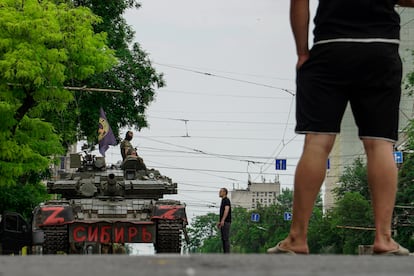Russia, between Putin’s ‘long night’ and the ‘fleeting phenomenon of civil war’
The main unknown in Wagner’s attempted rebellion is whether Prigozhin’s uprising is an isolated act of a defiant coup plotter, the figurehead of one (or several) Kremlin families, or both

The head-on clash - with the danger of drifting towards civil war - between Yevgeny Prigozhin and his private army Wagner, on the one hand, and the Russian Ministry of Defense and the institutional hierarchy of the State, on the other, was an outcome that had been anticipated and reiterated by analysts of different tendencies. However, no one knew when it would happen, with what consequences, with what depth and at what cost. The first unknown has now been cleared up.
The rebellion was apparently brought forward because Prigozhin had been harassed and driven to a dead end by the systematic attempt by President Putin and the Defense Ministry to clip the wings of the man whose troops were glorified until recently for their key victories in the war in Ukraine and glorified by Kremlin propagandists.
The harassment had intensified in recent weeks. This month the Russian State Duma passed legislation aimed at returning the monopoly of violence to the state, and under this legislation, all fighters, whether mobilized, volunteers or convicts, must submit to the hierarchy of the Ministry of Defense. The army of the Chechen leader, Ramzan Kadyrov, has disciplined itself to the measure. Wagner has not. The lower house of the Russian Parliament has also approved regulations for recruiting for the front (and also pardoning) criminals in the process of serving their sentences.
These two measures meant that Wagner is left without the possibility of constituting a private army of mercenaries taking advantage of the opaque unregulated terrain that Putin maintains (in many areas) in order to facilitate the action of those subjects - allied or conjuncturally useful to him - who could not act within the framework of the law of the Russian Federation. Mercenaries are forbidden in Russia and all attempts to regulate the status and powers of Wagner and private military companies in Parliament have so far been in vain.
In that gray space, outside legality, Wagner operated as long as it was useful to the Russian authorities, and there it remained until it ceased to be so, when Prigozhin embarked on an escalation of accusations and insults against the Ministry of Defense, Russia’s ruling elite and the official rationale and explanations for the cause of the war.
From the time the Kremlin enlisted Wagner’s support for the invasion of Ukraine until it became alarmed by Prigozhin’s emboldening, the so-called “Kremlin cook” has built up an army of his own with several tens of thousands of men, and thousands of former prisoners have returned from the front and been pardoned thanks to him.
From outside the scenario in which Prigozhin, the Kremlin and Russia’s state institutions act, it is not yet possible to discern whether the uprising of this populist outspoken person is the isolated act of a defiant coup-maker, the figurehead of one (or several) Kremlin families, or both at the same time. In the latter case, it would be necessary to know what was the element that tipped the balance between Prigozhin’s personal interests and his ties to the elite. In his brief speech, President Vladimir Putin referred to the mutiny as a betrayal, and only those who have been trusted commit treason. Putin did not mention Prigozhin’s name or that of Defense Minister Sergey Shoigu.
On Saturday afternoon, Prigozhin made an effort to ease the tension, congratulated himself for not having shed blood and, in the name of a sense of responsibility, claimed to have called off the “march for justice” aimed at leading his men to Moscow. However, whatever the outcome of the struggle that is manifesting itself in all its rawness, the situation will no longer be the same in Russia, for if until June 23 the epicenter of the story was the war against Ukraine, now the perspective is focused on the specter of civil war among Russians. The fact that the march met so little resistance in its advance towards the capital raises doubts about the level of defense of the State’s territory and may weaken President Putin, according to Russian media in Moscow.
If Prigozhin is the appendage of one of the Kremlin families, one wonders whether these families could agree to sacrifice the troublesome mutineer (and perhaps to shuffle different scenarios for the end of the feud). Or perhaps one of these families would prevail over the others.
Alongside these theoretical hypotheses, it is worth asking how Wagner’s withdrawal from the Ukrainian front will affect the combat capability of Russian troops and also the already flagging morale of those men sent to fight in the name of their commanders’ delusions. Will there be splits in the Russian Armed Forces or, on the contrary, will the troops remain united?
Impact on the situation in Ukraine
It is also worth asking how (or if) Ukraine will take advantage (or know how to take advantage) of the current situation in Russia. Another point to be resolved -and this affects the processes that may develop behind the scenes in Russia- are the possible attempts to forge alliances between exiled oligarchs, eager to recover the money that Putin’s regime took away from them, and sectors of the Russian Administration that would like to collaborate with them and return to a more pleasant and less belligerent life with the world. The reaction of the oligarch Mikhail Khodorkovsky, the former head of the Yukos oil empire, exiled after 10 years in prison in Russia, is interesting. Khodorkovsky had supported the now-cancelled march of the Wagners from Rostov-on-Don to Moscow. In the event that Prigozhin marched on Moscow, Khodorkovsky recommended preventing them from stopping him, helping with fuel and “convincing those who are sent to stop him that the enemy is now a common one”.
Putin’s speech after the uprising should serve as a guide for the regional administrations of Russia and determine the behavior of their leaders. Daily life in Moscow and St. Petersburg has already been disrupted and in the Russian capital, whose security began to be visibly increased several days ago, posters and street banners with which Wagner invited to conscription are hastily removed. In the provinces of Rostov-on-Don, Voronezh and Lipetsk, on the other hand, things seemed to be less clear from the outset. And for the Russian population, it may be difficult to assimilate that the heroes of the battles of Bakhmut or Soledar are now vanishing from official memory as if by a stroke of magic.
“Civil war in Russia is a norm and can drag on for decades in a latent form and alternating with acute phases,” writes analyst Vladimir Pastukhov, according to whom the latest cycle of aggravation of this civil war began in 1989 and has not yet ended. “The Prigozhin mutiny is only one of the episodes of this civil war that has been going on for almost half a century,” Pastukhov writes. And the political scientist recalls that when there is civil war, there are no nuances or middle ground and one is “either with the Reds or with the Whites.” The choice is painful. “Between Putin and the long night of Russia” and “the fleeting phenomenon of Prigozhin’s civil war,” he says.
Sign up for our weekly newsletter to get more English-language news coverage from EL PAÍS USA Edition
Tu suscripción se está usando en otro dispositivo
¿Quieres añadir otro usuario a tu suscripción?
Si continúas leyendo en este dispositivo, no se podrá leer en el otro.
FlechaTu suscripción se está usando en otro dispositivo y solo puedes acceder a EL PAÍS desde un dispositivo a la vez.
Si quieres compartir tu cuenta, cambia tu suscripción a la modalidad Premium, así podrás añadir otro usuario. Cada uno accederá con su propia cuenta de email, lo que os permitirá personalizar vuestra experiencia en EL PAÍS.
¿Tienes una suscripción de empresa? Accede aquí para contratar más cuentas.
En el caso de no saber quién está usando tu cuenta, te recomendamos cambiar tu contraseña aquí.
Si decides continuar compartiendo tu cuenta, este mensaje se mostrará en tu dispositivo y en el de la otra persona que está usando tu cuenta de forma indefinida, afectando a tu experiencia de lectura. Puedes consultar aquí los términos y condiciones de la suscripción digital.









































